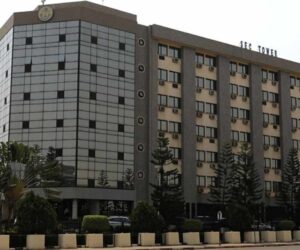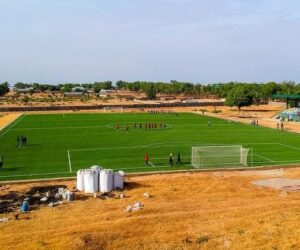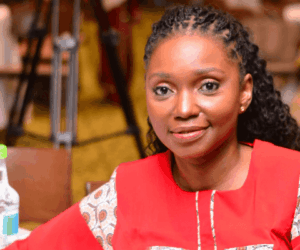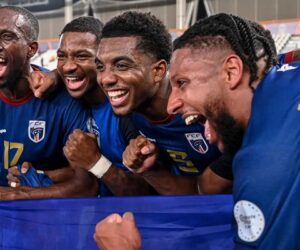As Nigeria marks its 65th Independence anniversary, the nation’s sporting journey stands as one of resilience, triumph, and moments of global recognition. Sports in Nigeria is deeply interwoven with its nationhood, often serving as a unifying force that lifts spirits and projects the country’s image on the world stage.
Although Nigerians had participated in competitive sports before Independence in 1960, the past six-and-a-half decades have produced defining moments that placed the green-and-white flag at the heart of global sporting celebrations.
In athletics, Nigeria’s men’s 4x400m relay team wrote history at the Sydney 2000 Olympics, initially winning silver before being upgraded to gold after the disqualification of the American team. Four years earlier, Chioma Ajunwa had blazed the trail in Atlanta, becoming the first Nigerian and black African woman to win Olympic gold in a field event.
Read also: Vision beyond borders: Nigerian entrepreneurs from independence to the world
More recently, hurdler Tobi Amusan etched her name into history at the 2022 World Championships in Eugene, Oregon. She not only clinched gold in the women’s 100m hurdles but also smashed the world record with a time of 12.06 seconds, a feat that reverberated across global athletics.
Nigerian football has also been a rich source of national pride. The Super Eagles’ three Africa Cup of Nations (AFCON) triumphs remain iconic, while the 1996 Olympic football team, dubbed the ‘Dream Team,’ stunned the world by winning gold in Atlanta, becoming the first non-European nation to achieve the feat in 68 years. At the club level, Enyimba International of Aba made history in 2003 and 2004 by winning back-to-back CAF Champions League titles, a first for Nigeria.
Basketball has equally seen remarkable strides, with D’Tigress, Nigeria’s women’s team, establishing dominance in Africa and earning global recognition through their World Cup appearances.
From Olympic tracks to football pitches and basketball courts, Nigerian athletes have consistently showcased resilience and excellence despite structural challenges that often impede sporting development compared to African peers like Egypt, Morocco, and South Africa.
Nigeria made history in 1985 when the Golden Eaglets defeated Germany 2-0 to win the inaugural FIFA Under-17 World Cup in China. That landmark victory was the first time a team outside Europe and South America had lifted a major global football trophy, cementing Nigeria’s place as a rising force in world sport.
Earlier, in 1980, the Green Eagles hosted the Africa Cup of Nations (AFCON) and clinched their first-ever title at the National Stadium in Lagos. Under coach Otto Gloria, with stars like Segun Odegbami and Christian Chukwu, Nigeria swept past Algeria 3-0 in the final, igniting unprecedented national celebration.
Boxing also delivered moments of pride. In 2008, Samuel Peter defeated Russian-American Oleg Maskaev in the sixth round to claim the WBC heavyweight title. Decades earlier, Nigerian-born Richard Ihetu, famously known as Dick Tiger, carved his name in history by winning the WBA middleweight title in 1962 against Gene Fullmer and later the light heavyweight crown in 1966 after dethroning Puerto Rico’s José Torres. Hogan ‘Kid’ Bassey, Nigeria’s first world champion, had paved the way in 1957 when he became the world featherweight king.
These achievements built on earlier pioneering feats such as Emmanuel Ifeajuna’s gold medal in the high jump at the 1954 Commonwealth Games, the first for an African athlete. Together, these trailblazers laid the foundation for Nigeria’s sporting identity.
Sports’ decline
Former Nigerian international Friday Ekpo has reminisced about the glory days of Nigerian football in the 1980s and 1990s, while sports analyst and SuperSport Nigeria General Manager, Felix Awogu, has pointed to economic and governance issues as key reasons for the country’s sporting decline.
In a chat with BusinessDay, Ekpo reflected on Nigeria’s football journey, noting both progress and setbacks.
“I mean, it has not been easy when it comes to sport. We started building up gradually before I was even born — when they were playing without boots, barefoot and all the rest. Gradually, we changed from one era to another,” Ekpo said.
“In terms of sport and football, there has been gradual progress and development. But in between, we’ve had our ups and downs. We need to go back to see where we went wrong and what we need to do to come back stronger. In every other sport, it has been like that. But in football, which I know a little more about, it has been up and down.”
Despite the challenges, Ekpo is confident that Nigerian football is beginning to show signs of revival.
“We are picking up now. When it comes to Nigerian football, especially the Nigerian Premier League, I have seen great improvement in the last 10 to 12 years. I know that, in due course, we will get back there again,” he added with optimism.
Read also: Independence Day: Abiru salutes Nigerians’ resilience, steadfastness
For Awogu, however, the struggles in Nigerian sports cannot be divorced from the country’s wider economic and political realities.
“The truth is that other countries are also progressing, just as we are. It depends on which one is progressing at a faster rate. If you look back in the short term, we have been declining. We won the Olympic gold in Atlanta in 1996. Since then, we’ve not won any,” Awogu observed.
He stressed the need to address deeper systemic challenges:
“Well, you cannot take away sports from the larger society. Are we doing the right thing at the national level? That’s the big question we need to ask. What is the quality of leadership we have in government generally? You cannot separate that from what we see in football and other sports.”
Awogu also acknowledged that while some football has struggled, other sports have shown resilience despite limited support.
“We cannot condemn everything in totality. Some sports have really lifted themselves. Take cricket, for example. They’ve been doing fantastic even without government funding. So, we can’t throw that away.”
From the 1960s through the 1990s, football and athletics were Nigeria’s strongest pillars, with football in particular emerging as a unifying force. But in the last two decades, administrative shortcomings, underfunding, and poor grassroots structures have weakened the country’s dominance on the continental and global stage.
Yet hope remains. Nigerian athletes continue to produce flashes of brilliance, while sports enthusiasts and experts believe that with stronger investment, visionary leadership, and strategic planning, the country can reclaim its status as Africa’s sporting giant.
At 65, Nigerian sports still symbolise the nation’s enduring spirit, one that has celebrated triumphs, endured setbacks, and continues to inspire future generations.









